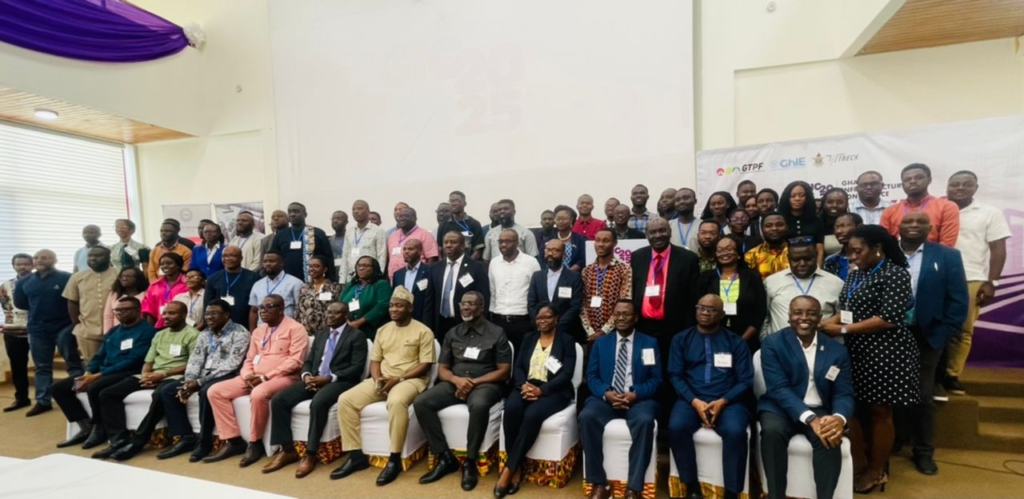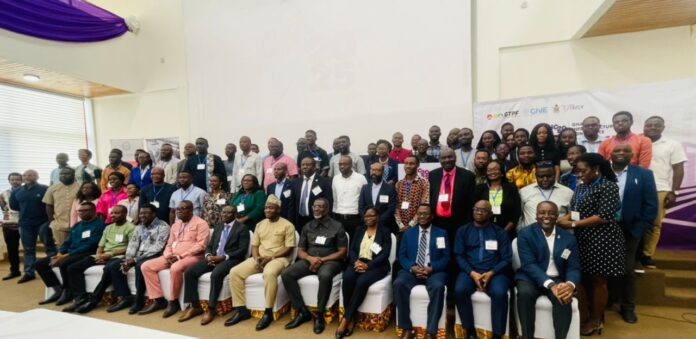
The Deputy Minister of Roads and Transport, Alhassan Suhuyini (seated middle), in a group picture with some of the particpants
The Minister of Roads and Highways, Governs Kwame Agbodza has said that good governance is the pillar upon which Sustainable Infrastructure rests.
According to him, it is about ensuring that every project is transparently procured, properly supervised and diligently maintained, adding, “It is also about fighting inefficiency, eliminating waste and holding both public and private actors accountable”.
He said this in a statement read on his behalf by the Deputy Minister of Roads and Highways, Alhassan Suhuyini, MP for Tamale North, as the Special Guest of Honour at the Ghana Infrastructure Conference 2025 (GIC 2025), held at the Ghana-India Kofi Annan Centre of Excellence in ICT, Accra, on Wednesday, 6th August, 2025.
According to the Roads Minister, the theme for the Conference: “Rethinking Infrastructure for Development: Governance, Ethics and Strategic Planning Perspective”, speaks directly to the challenges and opportunities we face as a country.
He added that the theme aligns closely with the vision of the Ministry of Roads and Highways and the collective responsibility to build an infrastructure system that is modern, inclusive, resilient, and ethically managed.
He commended the partners of the Ghana Infrastructure Conference 2025, namely, Ghana Institution of Engineering (GhIE), Ghana Transportation Professionals Forum (USA) and the Regional Transport Research and Education Centre Kumasi (TRECK) at the Kwame Nkrumah University of Science and Technology (KNUST), for keeping ethics on the national agenda.
The Minister reminded the participants, who were mostly engineers and academia that rethinking infrastructure is not the job of government alone. It is a shared national responsibility. We need bold engineers, ethical contractors, proactive researchers, engaged communities and strong institutions.
The Keynote Speaker of the conference, Prof. Justice N. Bawole, who spoke on the “Role and Need for Ethical Governance in Infrastructure Development”, said, “Infrastructure is not simply about concrete and steel; it is about trust. It is about the promise that public resources—our taxes, donor funds, and natural resource revenues—will be used responsibly to advance collective well-being. When governance is ethical, infrastructure serves as a bridge to opportunity; when it is not, infrastructure becomes a monument to misplaced priorities, waste, and corruption.
He explained that, ethical governance refers to the practice of leading, managing, and making decisions in public and private institutions guided by moral principles and integrity.
“It involves going beyond mere compliance with laws and regulations to uphold higher standards of fairness, transparency, and accountability—even when the law is silent or weak. In the context of infrastructure development, ethical governance means that every phase—from planning and procurement to construction and maintenance—is guided by a commitment to serve the public interest, safeguard resources, and deliver value to present and future generations. Ethical governance as a blend of virtue exhibited in character, duty, and outcomes. In practical terms, it is about ensuring that decisions are not just legal, but morally defensible and socially just”, he added.
The Vice President of GhIE, Ing. Dr. Patrick Amoah Bekoe, who spoke on behalf of the President of GhIE, Ing. Ludwig Annang Hesse, said, the state of our nation’s infrastructure remains a pressing concern. The public is rightly troubled by the lack of maintenance of critical public assets.
“While we urge the government to prioritize infrastructure maintenance, I also call on my fellow practitioners to uphold ethical standards in all projects. Regrettably, there are charlatans—individuals not registered under the Engineering Council of Ghana Act (Act 819)—who pose as professionals, tarnishing the reputation of our noble profession. In the coming weeks, the Engineering Council will intensify efforts to hold such individuals accountable”, he intimated.
Opening remarks were delivered by other partners of the Ghana Infrastructure Conference. Dr. Kwaku Boakye, PE (President of GTPF), Prof. Helen Essandoh (Director of TRECK) and Ing. Dr. Patrick Amoah Bekoe, Vice President of GhIE.
Dr. Dan P. Seedah, PE, Global Principal Data Insights and Predictive Analytics, also made an impressive presentation on the Benefits and Challenges of Digitization, Data and Technology in Ethical Governance.
The two-day conference, which started on 6th August and ended on 7th August, discussed topics related to the theme and will present their final communique to the Minister of Roads and Highways for his consideration and send copies to all the partners and participants of the Ghana Infrastructure Conference, 2025.
Present at the conference included the Immediate Past President of GhIE, Ing. Kwabena Bempong; a Past President of GhIE, Ing. Magnus Lincoln Quarshie; Ag. Executive Director of GhIE, Ing. Samuel Magnus Asiedu; a Past President of GhIE and Transport Leader, Rev. Prof Ing. Charles Anum Adams. Ing. Dr. Lucy Agyepong was the Master of the Ceremony.
DISCLAIMER: The Views, Comments, Opinions, Contributions and Statements made by Readers and Contributors on this platform do not necessarily represent the views or policy of Multimedia Group Limited.
DISCLAIMER: The Views, Comments, Opinions, Contributions and Statements made by Readers and Contributors on this platform do not necessarily represent the views or policy of Multimedia Group Limited.


